

Workplace Culture Is More Important Than Anything Else. Photo: Instagram/nadavshoval Companies sink or swim based on their internal culture.
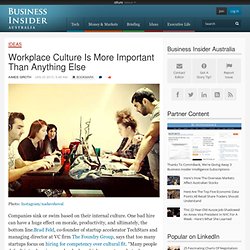
One bad hire can have a huge effect on morale, productivity, and ultimately, the bottom line.Brad Feld, co-founder of startup accelerator TechStars and managing director at VC firm The Foundry Group, says that too many startups focus on hiring for competency over cultural fit. Tea and Empathy with Daniel Goleman. The High Cost of Low Wages. Wal-Mart’s legendary obsession with cost containment shows up in countless ways, including aggressive control of employee benefits and wages.
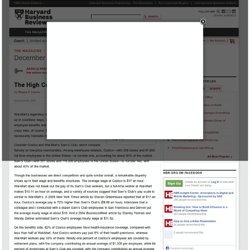
Managing labor costs isn’t a crazy idea, of course. But stingy pay and benefits don’t necessarily translate into lower costs in the long run. Consider Costco and Wal-Mart’s Sam’s Club, which compete fiercely on low-price merchandise. Among warehouse retailers, Costco—with 338 stores and 67,600 full-time employees in the United States—is number one, accounting for about 50% of the market. Sam’s Club—with 551 stores and 110,200 employees in the United States—is number two, with about 40% of the market. Though the businesses are direct competitors and quite similar overall, a remarkable disparity shows up in their wage and benefits structures. On the benefits side, 82% of Costco employees have health-insurance coverage, compared with less than half at Wal-Mart. These figures challenge the common assumption that labor rates equal labor costs. 12 Simple Things A Leader Can Do To Build A Phenomenal Team. The Two Most Important Words. When I arrived at Mattel, the company was losing almost a million dollars a day, the bonus pool was empty, and equity awards were underwater.
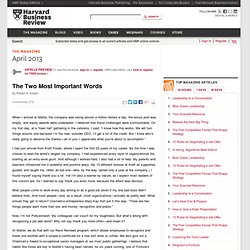
I believed that those challenges were surmountable. On my first day, at a “town hall” gathering in the cafeteria, I said, “I know how this works. GitHub's Code For Workplace Happiness. GitHub CEO Tom Preston-Werner is on the phone from San Francisco speaking with the cordial certainty of a professor.

Halfway through our conversation, I read to him something he blogged back in October 2010: At Github, we don't have meetings. We don't have set work hours or workdays. We don't keep track of vacation or sick days. We don't have managers or an org chart. The Proof Is In The Profits: America's Happiest Companies Make More Money. “Goodness is the only investment that never fails.”
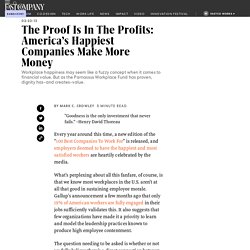
--Henry David Thoreau Every year around this time, a new edition of the “100 Best Companies To Work For” is released, and employers deemed to have the happiest and most satisfied workers are heartily celebrated by the media. What’s perplexing about all this fanfare, of course, is that we know most workplaces in the U.S. aren’t at all that good in sustaining employee morale. Gallup’s announcement a few months ago that only 19% of American workers are fully engaged in their jobs sufficiently validates this. It also suggests that few organizations have made it a priority to learn and model the leadership practices known to produce high employee contentment.
The question needing to be asked is whether or not we fully believe there’s a direct connection between having happy workers and improved profitability. What monetary rewards can and cannot do: How to show employees the money - monetary-rewards.pdf. A Simpler Way to Get Employees to Share - Michael Schrage. By Michael Schrage | 9:00 AM December 13, 2012 A few years back, I helped a large, very compartmentalized and extremely silo-ed global organization launch an internal competition.

Its goal was to promote greater sharing of ideas, information, best practice and innovative processes. Leadership recognized that business units and functions had effectively been allowed to ignore the rest of the enterprise. Significant opportunities and resources were left underexplored or untouched. Where Culture is King. Where Culture is King Despite size, scope or industry, the Most Admired Companies for HR share a commitment to culture centered on values every employee lives by. By Maura C. 5 Ways to Make Employees More Productive. Want to dramatically improve your employees' performance without spending any money?
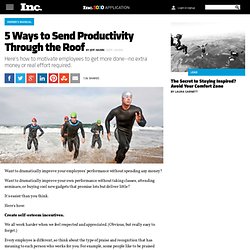
Want to dramatically improve your own performance without taking classes, attending seminars, or buying cool new gadgets that promise lots but deliver little? It's easier than you think. Here's how: Create self-esteem incentives. We all work harder when we feel respected and appreciated. Every employee is different, so think about the type of praise and recognition that has meaning to each person who works for you. Then build incentives based on what makes the most impact. The Real Point of Gift-Giving - Peter Bregman.
By Peter Bregman | 1:18 PM December 15, 2010 A few weeks ago was my birthday.

I turned 43. 43 doesn’t mark a new decade. Preserving Your Culture During A High-Growth Phase: 5 Keys to a Successful Culture. For the last several years, not a month has gone by without at least one well-meaning, concerned employee pulling me aside and asking me, something like, “Clate, how are we going to preserve our amazing culture as we continue to grow at such a fast pace?”

I always tell them that we’ll be true to our Core Philosophy and we’ll be just fine. But the truth is, a few years ago, we had just raised venture capital, we were about to begin hiring at a very brisk pace, and I wondered the same thing: “How would we preserve our great culture while hiring very quickly.” Since that time, we’ve grown the company from 50 to 175 employees, our revenue has quadrupled, and our culture has never been better. As I’ve considered what we’ve done to make this happen, I came up with 5 Keys to our success. I share them as suggestions for anyone serious about keeping a great culture while going through a rapid growth phase. Articles - Building Companies to Last. Inc.
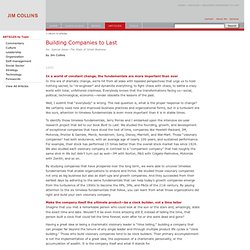
Special Issue—The State of Small Business. Culture Code: Creating A Lovable Company. Make It a Habit to Give Thanks - Ron Ashkenas. By Ron Ashkenas | 12:00 PM November 20, 2012. To Give Your Employees Meaning, Start With Mission - Teresa Amabile and Steve Kramer - HBS Faculty. By Teresa Amabile and Steve Kramer | 11:00 AM December 19, 2012 It is impossible to have a great life unless it is a meaningful life. And it is very difficult to have a meaningful life without meaningful work. -Jim Collins Do you feel that you have work worth doing? If so, you are among the more fortunate of our readers. 10 Reasons Your Top Talent Will Leave You. The 9 Corporate Personality Types And How to Inspire Them to Innovate. Center of Excellence: Preserving corporate culture for sustained growth. I'm doing some research regarding the importance of corporate culture and how to perserve a small business corporate culture while continuing to grow the business.
While some may consider culture to be a bunch of mumbo jumbo, a strong corporate culture can really be critical to a businesses success and in particular to retaining top talent. Preserving Your Company Culture as Your Business Grows. Over the past year, has your business been steadily growing? Although this is a positive for your profits, you may be concerned about how this is influencing your company culture. It is your job as a business owner to ensure that your employees feel comfortable in the workplace, even as it grows bigger. There are many ways to help your team adjust, including customizing their benefit options. Having the ability to scale your company to still preserve the shared values and culture within takes time to learn.
As you move past the initial startup stages, here are some ways to keep your small business values and grow at the same time: • Keep the Same Perspective.